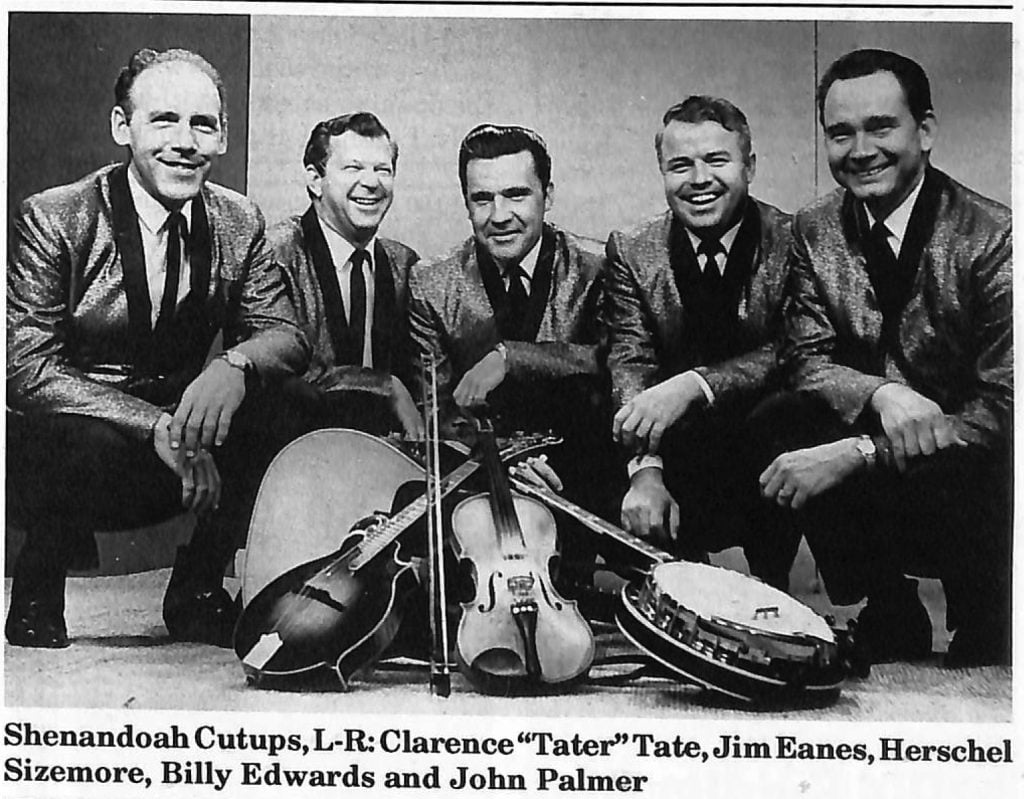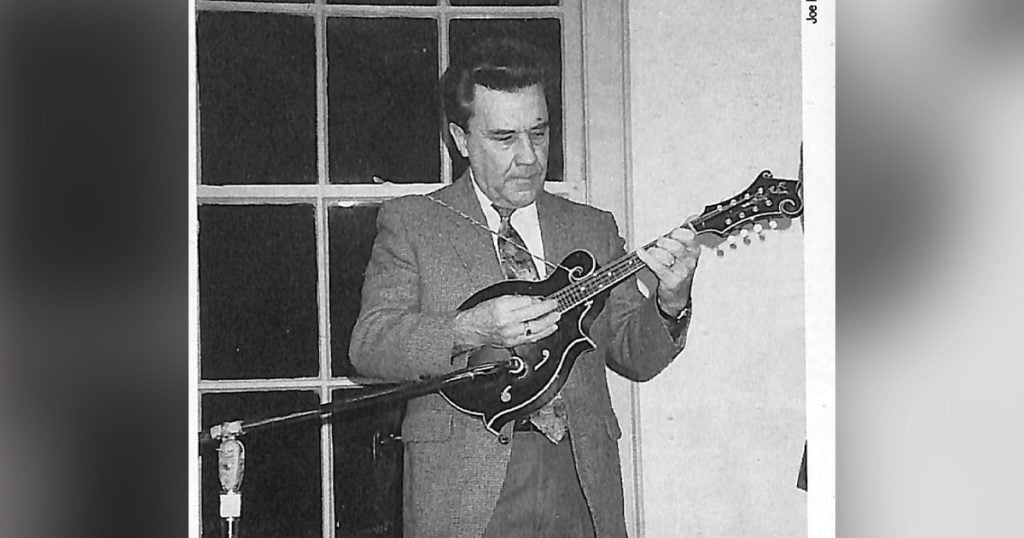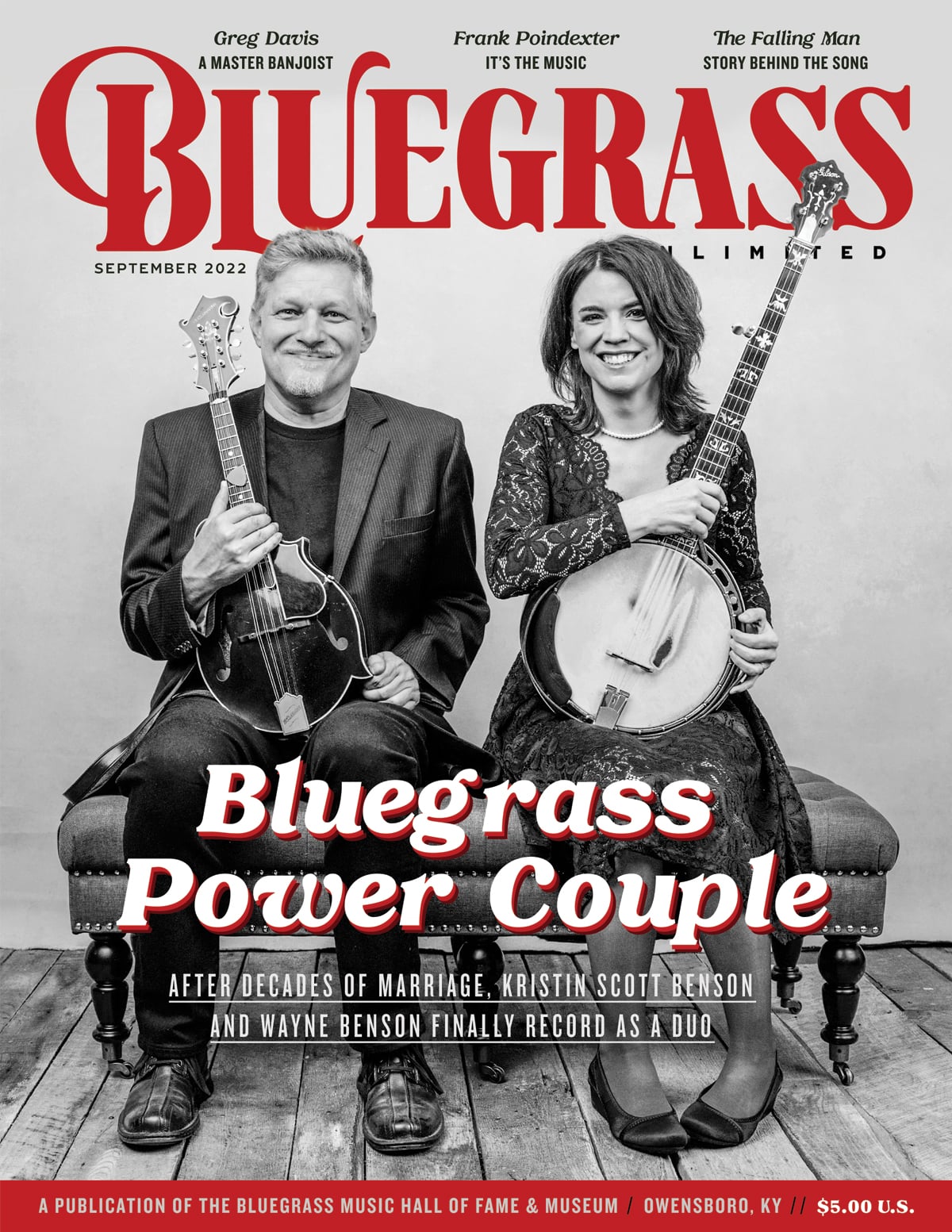Home > Articles > The Archives > Herschel Sizemore—A Mandolin Hero Returns
Herschel Sizemore—A Mandolin Hero Returns
Reprinted from Bluegrass Unlimited Magazine
August 1993, Volume 28, Number 2
After a 12-year absence from regular performing, mandolin hero Herschel Sizemore has returned to fulltime performing with the Bluegrass Cardinals. Sizemore, who had been active throughout the ’50s, ’60s and ’70s had taken a job with Purolator Courier and worked for them from 1974 until he retired in 1990.
Herschel was born on August 6, 1935, in Sheffield, Ala., to the late Claude and Rebecca Sizemore. The Sizemores owned a Silvertone battery-operated radio that gave young Herschel his first taste of music. At age eight, Herschel began playing on an old mandolin that his brother Ross had sent home from the Army. “I really don’t know what brand it was,” says Sizemore, “It was just an old flat-backed mandolin of some kind and that was about all anybody had back then.”
After Herschel had learned some chords on the instrument, he started playing music with an old-time fiddle player named Hugh McCormick. “Mr. Hugh was what we called him. He had bought an old school and turned it into his home and a music hall. My brother, just older than me and I would go over there and play just about every week.” Sizemore counts his mother and Hugh McCormick as his earliest musical influences.
“My mother played the guitar when she lived in southwest Tennessee. She played in the same style as Maybelle Carter and in her time was considered to be a very fine guitarist.” However, the most musically influential person in Herschel’s life proved to be Bill Monroe. “I went to the Grand Ole Opry when I was eight and Bill was playing there. I think it was 1943. Bill made a lasting impression on me. I kept asking momma when they were going to let Bill play again. I didn’t care anything about the rest of the acts. But when I saw him later with Flatt and Scruggs, I was really sold!”
At age 14, Sizemore got his first paying musical job. The band was Ned Campbell and the Sunnyside Playboys. They played schools and square dances in the area for whatever money they could get. Herschel remained with Campbell for three years.
In 1956, Herschel got his first professional break in music. Rual Yarbrough, Linden Smith, Billy Sizemore, Edison Dooley and Sizemore formed a group called the Tennessee Valley Playboys and performed under this name for six months. At this time, the group changed their name to the Country Gentlemen, but after hearing of another fledgling band by the same name (Duffey, Waller and Emerson) in the Washington, D.C. area, they changed their name to the Dixie Gentlemen. At about the same time, Linden Smith was replaced by Jake Landers, who had just been discharged from military service.
The Dixie Gentlemen remained active through the early ’60s and held quite a following. Over the years, several musicians, such as Vassar Clements and Al Lester, passed through the ranks of the band. In 1961, the group recorded an album for the major recording label United Artists and made an appearance at the D.J. Convention showcase in Nashville, Tenn.
The Dixie Gentlemen disbanded in 1965 and in 1966, both Rual Yarbrough and Sizemore, worked for the late Bobby Smith and the Boys From Shiloh. In 1967, Herschel went to work with Jimmy Martin and the Sunny Mountain Boys. While here, Sizemore worked alongside other band members Bill Yates, Chris Warner. Herschel counts the two years he worked with Jimmy as two of his musical best. He describes Martin as a perfectionist and one capable of getting the best out of a musician. Herschel still counts Jimmy a friend today. Herschel recalls, “Jimmy and I had some mighty good times together, Jimmy can probably remember us counting ground hogs beside the road as we went along just to pass the time. No doubt he can remember the time when he invited a fellow named George up on the stage and we couldn’t hardly get him off. Times like that you never forget.”
Sizemore left Martin in 1969, and by April of that year started working with the Shenandoah Cutups. At this time, Herschel moved his family from Leighton, Ala., to Roanoke, Va., where he and his wife of 38 years, Joyce, still reside. The Cutups consisted of Jim Eanes on guitar, Clarence “Tater” Tate on fiddle, Billy Edwards on banjo, John Palmer on bass and Herschel on mandolin. “When Red Smiley retired, we bought his bus. The other guys had worked for Red and we just went together as a band, came up with a name and went to work.” At the time I worked with the Shenandoah Cutups, there was a lot happening on the bluegrass music circuit and we stayed very busy and played a lot. As with anything else one does, there were good times as well as bad, but I don’t regret my time there because I left with a bunch of new friends.” Over the five-year span that Sizemore stayed with the Shenandoah Cutups, the band recorded eight albums for the Rebel, County and Revonah recording companies.
In the latter part of 1973, Sizemore left the Shenandoah Cutups. By this time, Tom McKinney had replaced Billy Edwards in the band on banjo and Wes Golding had been added on guitar. When Herschel left the group, McKinney and Golding followed. Wayne Golding was added on bass and Country Grass was born. The group recorded one album for Rebel Records and stayed together for two years. The Goldings remained in the band for the first year and were succeeded the next year by A.L. Wood and his son Mike. For the first time in his career, Sizemore was cast in the role of band leader. “Somebody has to make the phone calls and have the final say about arrangements, travel time and other things as well. I guess it just fell upon my shoulders to do it.”
In early 1976, A.L. and Mike Wood left the group. By this time, Tom McKinney had also departed. A.L. Wood had switched to banjo and Mike had moved over to fill the guitar slot. Derris Greene had came in to play bass. When the Woods left, Herschel became discouraged at the rate of personnel turnover and decided the group should be disbanded.
In 1974, Sizemore had taken a part-time job with Purolator Courier. It just so happened that at about the same time Country Grass split up, a full-time position with the firm came open. “A man has to have priorities and mine was to support my family. This job provided the financial security my family needed.” At this time, Herschel took leave of the music business and worked for Purolator.

Herschel played some on the side. But in 1978, the bug bit him and Herschel was playing full-time again. “Del McCoury and I worked a session together for R. C. Harris. Del came and spent the night at my house and before he left, I was a Dixie Pal.” Sizemore went on to work for McCoury for the next two years. Along with Herschel was Del’s brother Jerry on bass, the late Sonny Miller on fiddle and Dick Smith on banjo. When asked to sum up his time spent as a Dixie Pal, Sizemore states, “If you couldn’t get along with Del McCoury, I don’t care about talking to you…one of the most enjoyable experiences I’ve ever had.”
While working with Del McCoury, Herschel recorded his highly acclaimed “Bounce Away” album. The project contained five original instrumentals. One of the tunes included on this project was “Rebecca.” “I was sitting around one day working on songs for my album. The tune pretty much wrote itself. After I had finished the tune, I decided I would name the tune ‘Rebecca’ in honor of my mother. That evening I played the melody for my wife but I didn’t tell her that I planned to name the tune after my mother. After she had heard it, she told me that she thought I should name it for my mother as well. When I decided to record the tune, I sent a tape of it to Tom McKinney (who played banjo on the project) but it didn’t have a name on it. When he called me back, he said I should name the tune after mother also. So, I guess the tune was destined to be named ‘Rebecca.’ ”
The tune has since been recorded by Butch Baldassari, Ronnie McCoury and is prominently featured in Alison Krauss shows by Adam Steffey, “It is a humbling thing. I really appreciate them doing it. They play my tune very well and I’m just honored that they like it well enough to do it.”
In 1980, Sizemore took what was to be his longest hiatus from full-time performing. While working for Del McCoury, Herschel maintained a full-time job with Purolator Courier, but in 1980, Sizemore decided to give up performing for a “day-job.” This layoff lasted about 12 years. “I played some on the side and jammed a little now and then, but nothing really serious.”
Then in February of 1992, Sizemore returned to performing once again with the Bluegrass Cardinals. “I had known Don and David (Parmley) since around 1976 and I always enjoyed what they did. Joyce reminded me, after I retired from Purolator, that I loved music and it was all I ever really wanted to do anyway, so when the opening came up with the Cardinals, I jumped at the chance,” Sizemore is currently recording a follow-up to his “Bounce Away” album. “The project is for Hay Holler Harvest records. It will be more original instrumentals, some old standards and this time I’m going to do some singing as well.” The project should be released late in 1993.
When asked about his current favorites, Sizemore says, “I still love to listen to the Osborne Brothers and Del McCoury. But I also like to hear Doyle Lawson and Quicksilver and lately, the Lonesome River Band has really turned my head too.”
Though he appreciates all mandolin players, Herschel’s favorites are Bill Monroe, Bobby Osborne and Doyle Lawson. “Doyle really plays very clean, Bobby gets an incredibly beautiful tone and Bill started it all so, naturally, I highly respect him. I’m also very proud of Ronnie McCoury and how he has developed into such a fine mandolin player. It’s hard to name a favorite because there are so many good ones out there doing it now.”
Herschel is currently playing a 1923 Gibson F-5 mandolin, signed by Lloyd Loar. He also has a 1929 Gibson F-5 for sale. “I like the ’29 just fine, but the Loar is better suited for what I do.”
Luthier Randy Wood of Savannah, Ga., does all major work to Sizemore’s mandolins. “I do simple stuff myself, but anything really serious I have Randy to do. I think he is the best and I fully trust him.”
When asked to look in retrospect, Herschel says, “I’ve had a good time playing all these years and I’m glad to call all of the people I’ve worked with friends today.”
As for the future, Herschel states, “I intend to work for the Cardinals as long as they want me and as long as the people want to hear me.” If public approval is the gauge Herschel Sizemore intends to use in deciding when he takes another break from music, I’m afraid he’ll be waiting a long, long time.
Don Rigsby is a veteran of the music business, having worked for such artists as Dave Evans, Charlie Sizemore, Vern Gosdin and the Bluegrass Cardinals. He holds a B.A. in Journalism from Morehead State University in Morehead, KY

